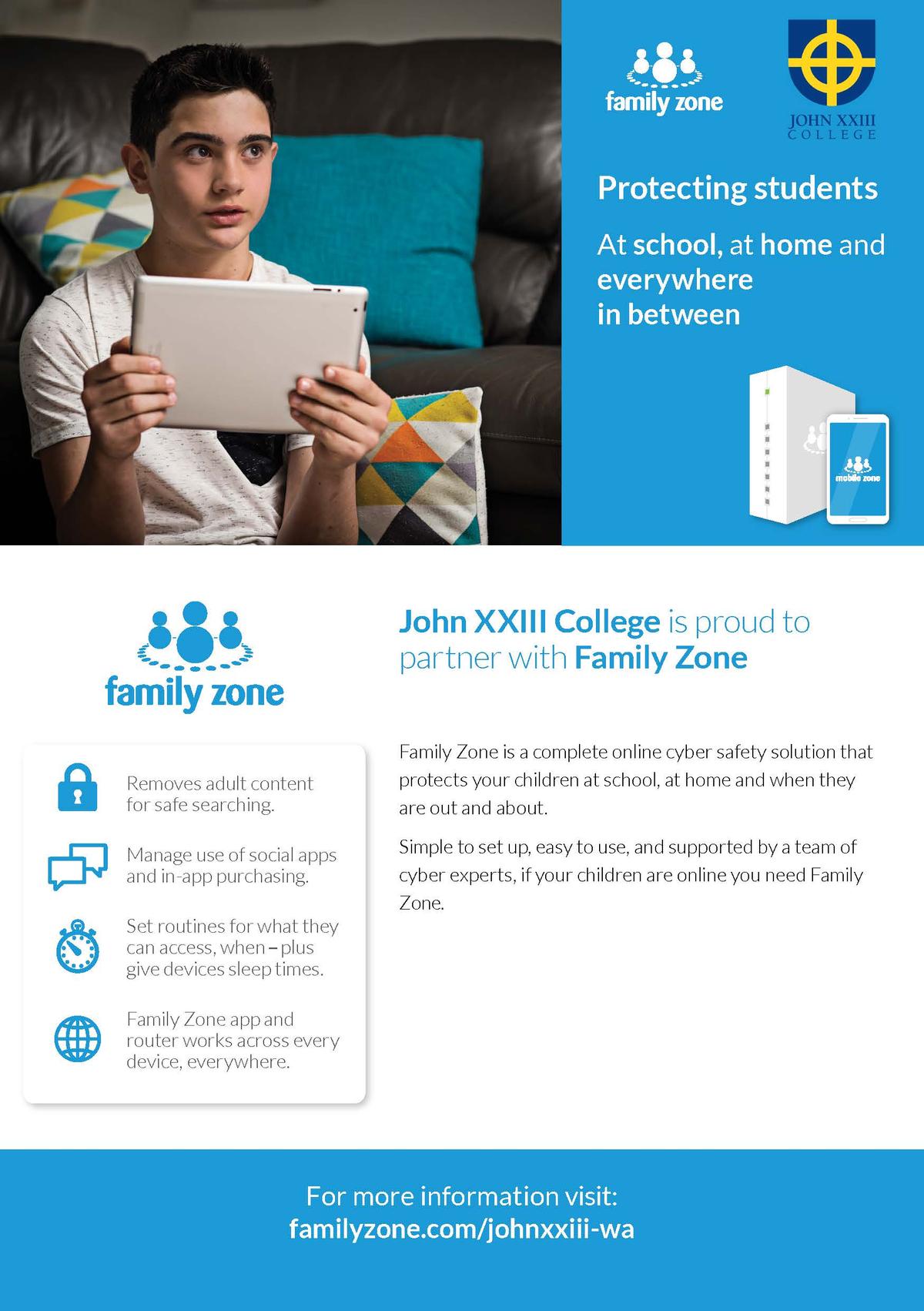Family Zone & Cyber Safety

Download Family Zone
Make use of the Family Zone Accounts which we are offering to John XXIII College families for free, as part of our College contract negotiations until April 2020.
By setting up a private Family Zone account, you can apply age-appropriate parental controls on every device your child has access to, in any location. To find out more visit https://www.familyzone.com/johnxxiii-wa
Family Zone Webinar recordings
For those that were unable to make the Family Zone webinars, we have recorded both sessions for you to view in your own time, and they are available here: https://www.familyzone.com/johnxxiii-wa
Webinar topics are:
- Getting Started with Family Zone
- Advanced with Family Zone
What kind of digital parent are you?
In the good old days - like 10 years ago - it was still possible to manage screen-time by imposing rigid limits.
For today’s families, that strategy - experts call it “gatekeeping” - is increasingly unworkable, as the boundaries between the online world and the offline world continue to blur.
For all but the littlest children, our screens are now essential to the way we live our lives - from the moment we wake up and check the weather to the time we climb into bed and say night-night to our notifications.
As much as we might like to turn back the hands of time (to use a metaphor our kids may never fully understand …), our children are growing up in always-connected world where distractions - - and potential online dangers - are only ever a click away.
The importance of mentoring
Sure, limiting screen-time is a no-brainer for responsible mums and dads. Because, let’s be real, without some strong gatekeeping, our kids might never make eye contact again.
But being a great digital parent is about so much more than blocking access. It’s about teaching kids to use screens wisely and well. To find balance. To develop critical skills. To value effort and growth. To practice kindness.
Being a great digital parent is about so much more than blocking access. It’s about teaching kids to use screens wisely and well.
And gaming, believe it or not, is a perfect case in point, say experts. You can turn your child’s love of computer games into a moral issue - a flashpoint for finger-wagging and threats. But by doing so, what are you actually teaching them?
“We see time and time again that parents aren’t engaged in the kind of mentoring and guidance around video games that they do for other parts of kids’ play and growing up and friendship relationships,” observes University of California researcher Mimi Ito.
What games can teach your child
Think about it this way, she suggests. You know how important it is to read to your child. You know how much more your child is getting out of that storytime beyond the story itself. Well, playing video games alongside your child is no different.
That’s what being a “media mentor” is all about, explains Anya Kamenetz, author of The Art of Screentime. “When you are sharing media time with your kids, you’re giving them the chance to better understand the messages they are coming across.
“You can learn social and emotional skills from this, just as you would from a story.”
Think about resilience, for example. With the proper guidance, gaming can teach kids to persist when the going gets tough. It can teach the value of practice making perfect - and underscore the importance of failure as a necessary step in the learning and growing process.
Mentoring also means limit-setting
Does being a media mentor mean always saying “yes” to screen-time? Absolutely not. That’s not being a mentor - that’s being a pushover.
Nor does it mean kids should never be allowed to be online on their own. Of course this is going to happen - and in today’s busy families, it might even happen pretty frequently.
The important thing, experts stress, is what happens next.
They recommend asking questions to encourage conversation - simple things like
- “What do you like about this?”
- “What bits were confusing?”
- “What seems annoying or creepy about it?”
Media mentoring for older kids and teens may not involve actually playing games alongside them.
Being an interested observer or even a cheerleader - rather than rolling your eyes or making sarcastic comments - is probably sufficient, and may even encourage self-regulation.
After all, we all know how counter-suggestible - aka bloody-minded - teens can be!
Mentors are also role-models
Another part of being a media mentor, says Kamenetz, is role-modelling. Are you constantly falling into the blackhole of your Facebook or Instagram feed? Are you checking notifications on your phone while your kids are trying to talk to you?
If so, you’re also teaching them a lesson: in this case “that that's an OK way to treat your family members.
“On the other hand, on the positive side, most of us use technology in the course of our work, our personal passions to learn about the world, to discover new music, to keep in touch with friends and family. And those are all positive things that we can share with our kids as well.”


